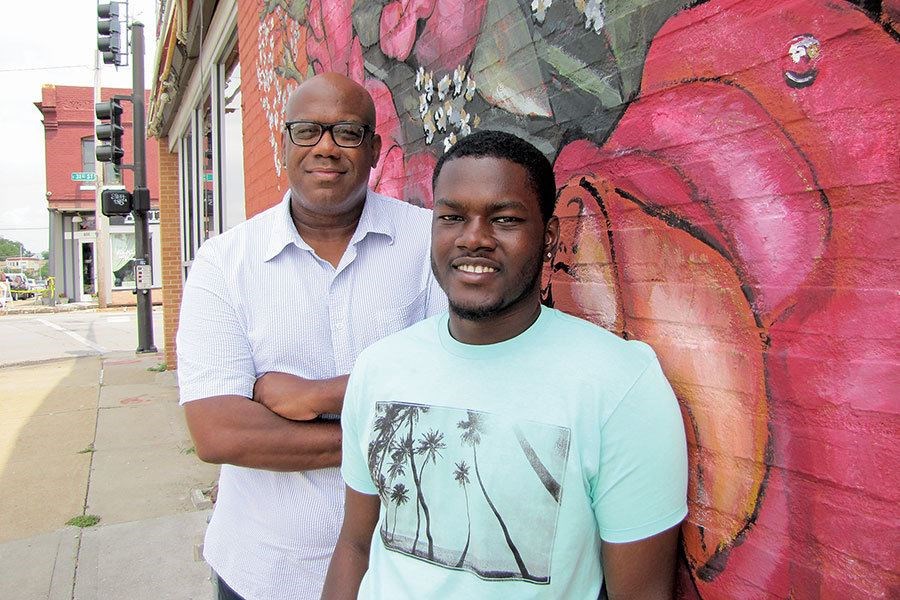The nonprofit Green Works gives opportunities such as internships to these students, who are often disadvantaged in engineering and other fields.
 Jerry Rose (l.), a member of the Green Works staff, poses with college student Lyndon Erery at the nonprofit’s headquareters in Kansas City, MO.David Karas KANSAS CITY, MO.—Lyndon Ersery is a junior studying engineering at the University of Missouri. Thanks to some intensive workforce training, he is well on his way to a successful career in the field.
Jerry Rose (l.), a member of the Green Works staff, poses with college student Lyndon Erery at the nonprofit’s headquareters in Kansas City, MO.David Karas KANSAS CITY, MO.—Lyndon Ersery is a junior studying engineering at the University of Missouri. Thanks to some intensive workforce training, he is well on his way to a successful career in the field.
A product of the public school system in Kansas City, Mo., Mr. Ersery is familiar with the barriers that students who don’t have access to contacts and internships encounter in trying to explore such a field. He credits Green Works, a nonprofit organization in Kansas City, with helping to provide him with a launching pad for his collegiate – and soon professional – career, and with “educating inner-city students like me and giving us a beacon of hope that we can be someone.”
Founded in 2007, Green Works blends workforce development and environmental education for urban high-schoolers. It forms partnerships with other organizations to help establish networks and opportunities for students, who receive job skills training and financial literacy education, in addition to paid internships.
Since the nonprofit’s founding, at least 280 students – Ersery included – have participated, and the team is working with 100 more students this academic year.
For Jerry Rose, Green Works’s director of community outreach and partnerships, the workforce development aspect of the organization is all about fostering opportunities, as well as the skills necessary to take advantage of those opportunities.
“Most organizations that mentor youth are activity-based,” says Mr. Rose, a retired FBI agent who came to Kansas City wanting to give back to the community and mentor young men and women, including those who don’t have positive adult role models. “Few nonprofits actually sit down with them and instruct, and tell them how to conduct themselves, how to prepare for an interview, how to act at work, how to be responsible, how to be accountable, and how to take criticism.”
The Green Works approach includes training in each of those areas, including the creation of a LinkedIn profile, the use of social media for professional advancement, and strategies for pursuing and holding an internship.
Kate Corwin, Green Works’s founder and president, is familiar with the dearth of professional opportunity for many city youths, having grown up in an urban neighborhood herself, and from her experience working with disadvantaged populations.
“Our students live in neighborhoods with few resources,” she says. “They have less exposure to role models from the business community. Many of our students are from low-income families and lack not only financial resources, but social capital connections to help them transition into the workplace.”
Ms. Corwin launched Green Works after seeing students graduate from high school without the means to continue their education. She also saw them struggle to find their place in the workforce.
“I realized that I could create programming that would expose high school students to growing careers including environmental careers in weatherization [of buildings], sustainable energy, and resource management,” she says. “Not only would it benefit the young adults, but it would benefit Kansas City by increasing the number of young people working at their capacity and contributing to the economy, not to mention caring about the environment.”
The environmental focus
As Corwin alludes to, Green Works offers environmental educational experiences, with some tangible outcomes for participants. Organizers have seen some of them make more-informed decisions about personal care products and food after learning about ingredients, and many become more comfortable in natural settings that aren’t always common in urban communities.
In this way, Corwin says, Green Works uses the environment “as the learning platform” for students, who usually participate for at least two years but often remain engaged in various educational and service-oriented projects following the program.
Green Works offers its programs and funds the paid internships on an average annual budget of $250,000, nearly 90 percent of which comes from contributions from corporations and private foundations.
“Our goal is to make long-term and life-changing investments in our students, empowering them to care for our environment, contribute to our economy, and create healthy communities,” Corwin says. “These students are future voters, taxpayers, homeowners, and environmental stewards.”
One student’s outlook
During a visit to the Green Works classroom space, Rose notes that Ersery’s public school education “did not prepare him for the challenges, the demands of an engineering student.”
Ersery recalls the intensive preparation he received from Green Works before the first of his two internships with major engineering firms in Kansas City, including mock job interviews, résumé writing sessions, and coaching on how to interact with and email colleagues and clients.
Given his own experiences, he is now working to form his own program to help mentor young men and women who are also seeking a career in engineering and could use a similar boost.
When asked about where he would be without Green Works, his answer is simple.
“I think I would be in engineering,” he says, “but I probably would not have had the internships and met the people I met.”
Page created on 2/24/2018 6:50:02 AM
Last edited 2/24/2018 7:00:38 AM
